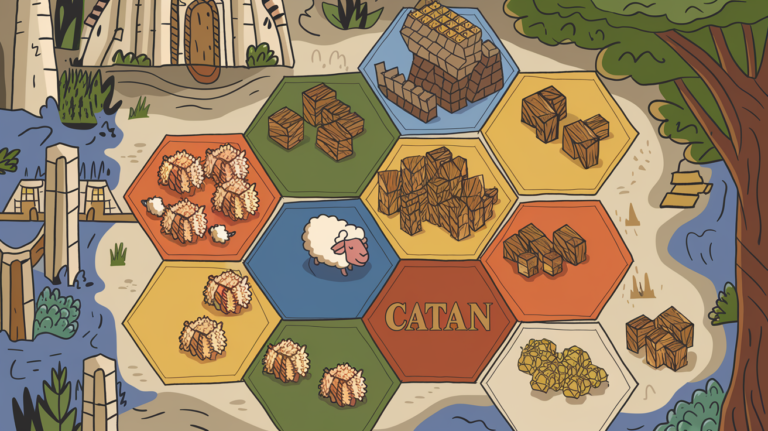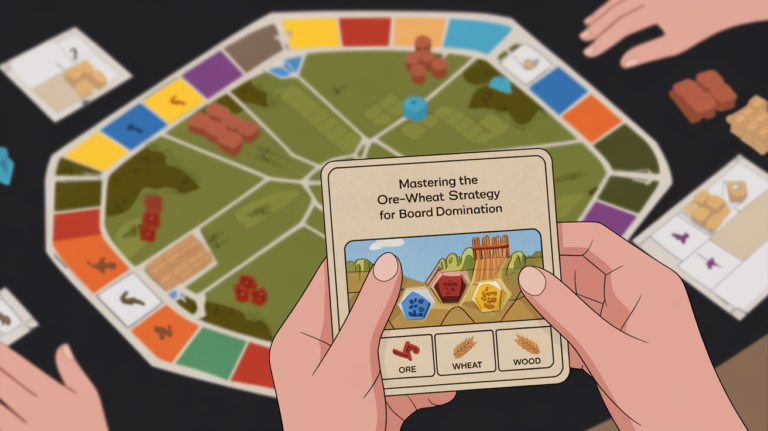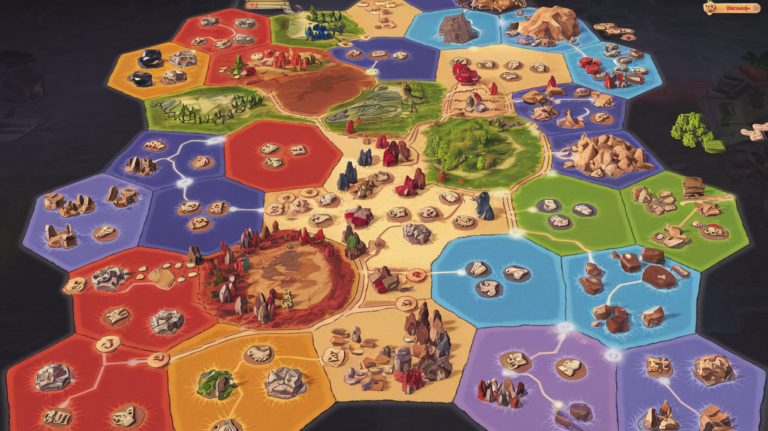Catan Trade Master: How to Negotiate Like a Pro

Have you ever felt like you were giving away gold for sand in Catan? Like your opponents are consistently getting the better end of every trade? You're not alone. Many players struggle with Catan resource exchange, but imagine transforming every trade into an advantage, consistently getting what you need, every time. Becoming a Catan Trade Master isn't about luck; it’s about mastering Catan negotiation skills. This guide will unlock Catan trade secrets, giving you the tools and knowledge to negotiate like a pro and dominate the board. You'll learn expert strategies that go beyond basic bartering, and you'll be ready to transform your next game with your new skills.
The Psychology of Catan Trading
Before we dive into tactics, let's understand the mindset behind successful trading, and the psychology of Catan trading. Understanding the underlying motivations and needs of your opponents is the first step in crafting advantageous trades.
Want to become a true Catan strategist? Begin with a strong grasp of the most effective settlement placements and the tactics of development card manipulation. Then, focus on building a strong resource generating infrastructure, understanding the value of the ore and wheat resource partnership, and exploring the most beneficial early resource setups.
Understanding Player Needs
To become a truly adept trader, you must first learn to decipher what other players need. Here's how:
- Reading the Board: Learn how to read other players' resource needs based on their visible development. What are they building? Which resources are they low on? Understanding their needs is the key to Catan resource management.
- Card Awareness: Understand what cards your opponents may have in their hand. If they have a lot of development cards, they may be looking for ore and wheat.
- Long Term Plans: Know what their long-term goals might be. Are they going for the Longest Road or Largest Army? Knowing this is vital for better Catan trading alliances.
Creating Perceived Value
The art of persuasion is often about making your offers seem more appealing than they truly are. Here are some ways you can create this perceived value:
- Making it Appealing: Craft your trade offers to seem more valuable. Show how the trade benefits your opponent, not just yourself. This is important for creating a feeling of fair trades in Catan.
- Manipulating Value: Learn how to manipulate the value of the resources. By understanding Catan resource values you can make an offer that seems good, but is actually better for you.
- Perceived Gain: Sometimes making other players think your trades are better than they are is as important as making sure that they are actually good for you.
Building Relationships
Trading in Catan isn't just about individual exchanges; it's about fostering relationships for long-term gains.
- Fair Trader: Build a reputation for being a fair trader. No one will want to trade with you if you consistently try and cheat them. This is important for good Catan trading etiquette.
- Alliances: Make alliances with other players to ensure you have partners to trade with, so that you will benefit more in the long run. If you have a reputation as a good trading partner, other players will seek you out for trades.
- Player Interaction: Know how to interact with other players during negotiations. Using friendly banter can sometimes make a big difference.
The Art of Persuasion
The words you choose can significantly impact the outcome of a trade. Here's how to use language to your advantage:
- Wording Offers: Word your trade deals in a way that makes them hard to refuse. Use the power of persuasion and make your trades sound like a good idea.
- Mind Tricks: Learn how to make other players think your trades are better than they actually are. This is key to Catan deal making.
- Reverse Psychology: Sometimes the best way to make someone accept a trade is to try and convince them that they don't want it.
Essential Negotiation Tactics
Now, let's move onto the practical strategies, and the Catan trading tips for beginners. These are the essential tactics that any Catan player should know before engaging in trades:
The Initial Offer
Knowing how to make an effective first offer can set the tone for the entire negotiation:
- Good Opening: Start with a strong, yet not overly generous, opening offer. What do you want, and what are you willing to give?
- Benefit You: Always try to ensure your trades benefit you, even if only slightly. Make sure that you come out on top from every trade you make.
- Leave Room: Do not make the initial offer too good, you should always leave room for negotiation, and never show all your cards at once.
Bargaining and Counteroffers
Trading is a give-and-take process, so you must understand how to bargain effectively:
- Small Steps: Use small steps to lead other players into accepting trades. You can always add something more, if you need to.
- Ask High: Start your offers higher than what you expect to get, this gives you space to negotiate down to something more favorable to yourself. Use Catan bargaining techniques.
- Know When to Accept: Do not get caught up in negotiation, you must also know when to accept, and not get greedy. Know when to accept and when to ask for more.
The Win-Win Mindset
While it's tempting to try to get the best of every deal, sometimes the best trades are those that benefit both parties:
- Mutual Benefit: Trades should benefit both you and the other player, if possible. This ensures future deals.
- Not All Trades are Good Trades: Sometimes it's better to not make a trade, especially if it doesn't benefit both parties. Understanding that not all trades should be made is key to how to get better trades in Catan.
- Strategic Giving: Sometimes strengthening a player who has less resources will be beneficial for you in the long run, as you can then trade with that person later.
The Power of Timing
Timing is often just as crucial as the actual offer when it comes to trades.
- Timing Offers: Know when to offer a trade and when to wait for a better opportunity. This is a key part of your Catan board game strategy.
- Best Value: Time your trades for the best possible outcome. When other players are low on resources, that is the best time to offer a trade for a high return.
- Timing is Everything: With trades, timing is everything, and you must be aware of the board to get the best value for your resources.
Advanced Trading Techniques
Let's elevate your trading game with some expert-level secrets and Catan advanced trading strategies:
Resource Manipulation
Learn to subtly control the board by manipulating resource availability to your advantage.
- Creating Scarcity: Make resources that you have seem like they are scarce by not offering them in trades. Creating an artificial scarcity of resources can be a great way to raise the value of those resources, giving you a better bargaining position.
- Board Manipulation: Learn how to make the resources you control more sought after. Understanding the mechanics of the board is essential.
- Resource Monopolies: Create an environment where others need a resource you have a resource monopolies, giving you full control.
The Favorable Trade
These advanced techniques can give you a subtle edge:
- Trading Up: Trading a resource that you need for more of that same resource. This gives the feeling that you have given a lot, but you still get the same resource.
- Strategic Advantage: Trading a resource you need less, for more of something you need more. This gives you a strategic advantage as you get more of the resource you value more.
- More for Less: Making a trade that benefits both parties, but gives you more of an advantage. This makes it a good trade all around, but is better for you.
The Long Game Trade
Sometimes the best trades are those that set you up for future success:
- Guarantee Trades: Make a small deal now, that will guarantee bigger deals later. This helps build relationships and trading partnerships for a long term benefit.
- Trading Partners: Trade a single resource now to make a bond with a player so that they want to trade with you again in the future.
- Long Term Advantage: Trade strategically now to gain an advantage in the long term.
The Strategic Pause
Master the subtle art of the pause to gain an advantage in your negotiations:
- Wait it Out: Pause for a second or two before making an offer. Make it seem like you are thinking about it, even if you already have an offer in mind.
- Deep Thought: Make it seem like you are thinking hard about an offer, before offering a counteroffer that will benefit you.
- Uncertainty: Create an environment where other players are not sure what they should do, to throw them off.
Reading Your Opponents
Gaining an edge in your trades requires learning how to read other players, and this is key for making profitable trades in Catan.
Analyzing Body Language
Body language is a crucial part of any negotiation, and Catan is no exception:
- Reading Players: Learn how to read your opponents body language to see what they are feeling and thinking. This is a big part of your catan game theory.
- Bluff Detection: Know when another player is bluffing so that you can get a better deal.
- Key to Trading: Body language can often tell you a lot about what a player is thinking, and is a huge part of your Catan trading psychology.
Detecting Desperation
Being able to spot desperation can help you negotiate better trades.
- Desperate Players: Identify players who are desperate for resources so that you can negotiate better trades.
- Target Trades: Trade with the players who need it, and have something that you need, to make the trades work for you.
- Target Weak Players: Target players who are struggling to trade for better and more beneficial trades.
Spotting Alliances
Understanding when other players are working together is key to having a successful trade game:
- Identify Groups: Be aware of players who are working together. If two players are always trading with each other, it is likely they are working together.
- Trade Adjustments: Learn how to change your trade offers based on the number of alliances that are active.
- Avoiding Traps: Do not fall into the traps that other players may try to set for you.
Common Trading Mistakes to Avoid
It’s just as important to know what not to do. Avoid these common trading mistakes:
Being Too Eager
Patience is key in trading, as eagerness can lead you to making bad deals:
- Don't Rush: Never give away too much too quickly, or show other players that you are desperate for resources. You must be patient.
- Wait: Always wait before making your moves, and do not let other players pressure you into a deal that you do not want.
- Hidden Desperation: Never let other players know how desperate you are for resources.
Overvaluing Your Resources
Don’t let emotion cloud your judgement:
- Equal Value: All resources are equal, and should not be overvalued.
- Don't Be Greedy: Don't be greedy with your offers, or you may scare other players away.
- Understanding Resources: Understand that all resources can benefit you at different times of the game.
Ignoring Long-Term Consequences
Trades now can have impacts in the future, so you must plan ahead:
- Future Impact: Understand that trades now can impact how other players will trade with you in the future.
- Long Term Planning: Know how your trades will impact your game in the long term.
- Beneficial Trades: Make trades that will benefit you not only now, but also in the future.
Underestimating your opponents
Never assume your opponents are easy to outwit:
- Awareness: Always be aware of other players resources and moves.
- Understanding: Understanding your opponents is key to trading.
- Always Observing: Always know what is going on around you, and never assume you are the smartest person in the room.
Practicing and Refining Your Trading Skills
To become a true trade master, continuous practice and a willingness to learn is key.
Experimenting with Different Approaches
The only way to get better is to try different approaches:
- Multiple Strategies: Try out different techniques and strategies to see what works best for you, and what works best for your playstyle.
- Adaptable Play: Always be adapting to the other players and the board state. This is a key component to understanding how Catan trading mechanics work.
- Don't Be Fixed: Don't use the same trade techniques every single game, or other players may catch on to your strategies.
Learning from Every Trade
The best players are those who are always learning:
- Analyze Results: After every trade, try and understand why it worked, and what you could have done better.
- Improve Each Game: You should always be improving your trade tactics, not staying stagnant and not improving.
- Avoid Mistakes: Don't make the same mistake twice. Always try to learn from your past games.
Seeking Feedback
Use every opportunity to learn, including asking for feedback from your fellow players:
- Talk to Others: Ask other players how they feel about the trades that you make. What could you have done better? What did they not like?
- Learn from Others: There are always better strategies and techniques that you can learn from your opponents, and they can sometimes offer a different perspective.
- Always Improve: Always be looking to improve your gameplay, and the trades that you make.
The Importance of Play
The more you play, the better you will get:
- Try out Strategies: The best way to improve is to use the different techniques that are discussed in this post.
- Always Improve: You should be trying your best to refine your trading strategy in every game that you play.
- Always Be Learning: Continue to refine your strategies and techniques each and every time that you play.
Conclusion
Becoming a Catan Trade Master is about more than just luck; it's about understanding the Catan trading psychology, mastering negotiation tactics, and leveraging advanced techniques. By reading your opponents, learning from mistakes, and practicing, you can transform your trades and dominate the board. So, transform your trades, dominate Catan, and become a true Trade Master! Go put your new skills to the test.
What are some of your most successful or interesting Catan trade stories? Share them in the comments below! Also, don't forget to share this post with your Catan-playing friends, so they can master the art of trading too! Check out our other Catan board game strategy articles for more tips and tricks!






